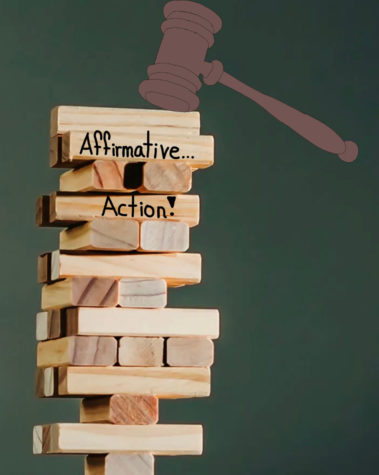OPINION | What if affirmative action dies?

Harvard and Yale recently withdrew from the U.S. News & World Report law-school ranking systems, citing the upcoming Supreme Court decision regarding affirmative action. According to Yale Law School dean, Heather Gerken, the rankings undermine the core commitments of the legal profession and discourage programs that provide need-based aid and recruitment of working-class students. Dean Gerken draws attention to the fact that U.S. News is a commercial magazine, and that its rankings exclude loan forgiveness programs when calculating student debt loads.
The Supreme Court is hearing two major cases concerning race-based affirmative action, and their decision stands to affect more than law school rankings. The Court, which currently has a conservative majority, may overturn the landmark case of Grutter v. Bollinger (2003). This case held that a school’s consideration of race in admissions did not violate the 14th Amendment’s Equal Protection Clause as long as race was considered in addition to other factors. If the Supreme Court elects to overturn this ruling, then considering an applicant’s race in college admissions would no longer be legal.
Of the two lawsuits, one accuses Harvard University of disproportionately rejecting Asian-American applicants. The second alleges that the University of North Carolina at Chapel Hill has violated the Civil Rights Act of 1964 by using race as a factor in admissions.
According to a study by the University of Washington and the Brookings Institution, already underrepresented minorities become less likely to attend and enroll in public universities after the state bans affirmative action. After California banned affirmative action, the representation gap at University of California, Berkeley rose from 14.9% to 34.4%.
If the Supreme Court rules that Harvard or UNC are at fault, the decision would bar public and private institutions from considering race in admissions. That means this trend could apply on a national scale, generally harming efforts to make academic and professional spaces more representative of the American population.
Some may see these Supreme Court cases as a chance to end a flawed practice. Removing race as a factor means that all applicants will face the same level of scrutiny regarding their academic and professional merit as opposed to their social identity. Evidence suggests that Asian-American applicants, who notoriously face the harshest admissions standards at elite institutions, would benefit from the removal of affirmative action practices. Others may argue that ending affirmative action would force colleges to find new, more effective ways to promote diversity on-campus.
Some race-neutral alternatives, such as selecting for socioeconomic diversity, have been considered for some time. It would also shake up the demographics of elite institutions — Harvard’s undergraduate body, for example, is mostly students of color. However, Harvard also has 15 times as many students from the richest one-fifth of the population than the poorest one-fifth. In terms of income, Harvard’s student body also represents the top 1% and the bottom 60% of wealth equally
From the outside looking in, it seems that elite institutions are simply choosing among varying colors of rich students. It’s understandable why some would want the Supreme Court to repeal affirmative action; however, doing so without an alternative in mind — something which the Supreme Court has no obligation to create — could worsen this already delicate situation.
Given that affirmative action, however flawed it may be, combats the underrepresentation of minority groups, it cannot be thrown away without something to take its place. Simply discarding it could make already homogenous institutions even less representative than they are. Institutions that would be affected by affirmative action’s repeal should prepare to institute another program for the sake of healthy representation — if only to make good on promises of diversity, equity and inclusion.
Your donation will support the student journalists of Tulane University. Your contribution will allow us to purchase equipment and cover our annual website hosting costs.


